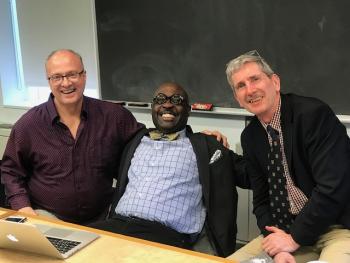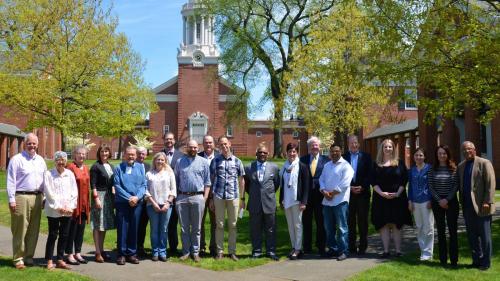Curriculum
The Andover Newton Seminary Diploma Program
- Download Andover Newton Student Handbook 2025-2026 (pdf)
- Download FAQs for Entering Students
What does the church need from clergy, and what do our clergy need to fulfill those purposes? These guiding questions have shaped Andover Newton’s curricular innovations from the seminary’s very beginnings. Of all the dimensions of Andover Newton’s heritage of which its constituents are proud, the school’s history of adaptation to the changing needs of the church rank high. Having created what became the gold standard in post-graduate theological education, the three-year Master of Divinity; and having introduced the idea of academic credit for mentored ministry, in the forms of Field Education and Clinical Pastoral Education (CPE); Andover Newton’s history of innovation is part of its very identity. Today is no different.  In May 2018, the Yale Divinity School (YDS) faculty approved an educational program through which YDS Master of Divinity candidates can earn Andover Newton diplomas concurrently with their degrees. The new program resulted from a year-long process, funded in-part by an Innovations grant from the Association of Theological Schools, of gathering and analyzing vast amounts of input from stakeholders and constituents. Participants in that study provided insights on the knowledge, dispositions, and skills most important for effective ministry today. YDS provides theological education in an ecumenical setacting, with a broad array of student goals in mind. Embedded in its world-class research university, YDS also offers opportunities for students to take courses across the university and experience the resources Yale offers. Andover Newton provides specific focus for students on ministry in locally-governed faith communities, enhancing the breadth of YDS with in-depth learning for aspiring clergy. Together, these two historic institutions provide MDiv students focused on ministry in congregations with a theological education that is broad, deep, and up-to-date. YDS’s MDiv program already offers the essential components of theological education, along with flexibility students can use to tailor programs to their goals. Andover Newton’s diploma program (see below), overlaid on the YDS MDiv, provides students with structure that helps them to use that flexibility to meet specific professional preparation needs.
In May 2018, the Yale Divinity School (YDS) faculty approved an educational program through which YDS Master of Divinity candidates can earn Andover Newton diplomas concurrently with their degrees. The new program resulted from a year-long process, funded in-part by an Innovations grant from the Association of Theological Schools, of gathering and analyzing vast amounts of input from stakeholders and constituents. Participants in that study provided insights on the knowledge, dispositions, and skills most important for effective ministry today. YDS provides theological education in an ecumenical setacting, with a broad array of student goals in mind. Embedded in its world-class research university, YDS also offers opportunities for students to take courses across the university and experience the resources Yale offers. Andover Newton provides specific focus for students on ministry in locally-governed faith communities, enhancing the breadth of YDS with in-depth learning for aspiring clergy. Together, these two historic institutions provide MDiv students focused on ministry in congregations with a theological education that is broad, deep, and up-to-date. YDS’s MDiv program already offers the essential components of theological education, along with flexibility students can use to tailor programs to their goals. Andover Newton’s diploma program (see below), overlaid on the YDS MDiv, provides students with structure that helps them to use that flexibility to meet specific professional preparation needs.
The Andover Newton Diploma Within the YDS MDiv
- A year-long general congregational leadership Colloquium: Ministers in the Making
- A half-year long Colloquium on leading Bible study
- A half-year long Colloquium on building community through worship
- Emmaus Encounters: Building Community on the Road
- Clinical Pastoral Education
- A pre-CPE integrative, preparatory seminar
- Supervised Ministry in a congregation
- Introduction to Pastoral Care
- 4.5 credits at the Yale School of Management (see a list of approved courses below)
- Weekly Bible study and worship together as a community
- Involvement in Andover Newton’s mission partnerships and celebrations
Clinical Pastoral Education, Border-Crossing, and field education in congregations are all hallmarks of Andover Newton’s historic MDiv that have been transplanted to New Haven with the School. New to the educational model is a requirement that students learn theory for management and leadership: Andover Newton diploma-earners take at least two courses in the Yale School of Management. This requirement resulted from convincing feedback from flourishing ministers interviewed and surveyed, who indicated that a changing ministry landscape requires them to function as nonprofit executive directors as well as pastors. Andover Newton’s faculty assesses student achievement with the following competencies in mind:
- an integrated understanding of theology, ministry, human nature, and life’s meaning
- value for, and ability to build, community
- compassion for others and care for justice in the community
- ability to listen and to read group dynamics
- effective communal and ministerial managers and leaders
- a deep and cultivated Christian faith
Students apply to YDS’s MDiv Program as a first step. The Christian church itself is a study in adaptation. From the Pentecost onward, the church has thrived in part due to its capacity to read the needs of the communities in which it was taking root. An adaptation to a new educational time, where the world needs a school that offers top-notch academic training and thoughtful ministerial formation, is Andover Newton’s way of contributing to that Gospel truth: God makes all things new.
*The inaugural group of Andover Newton Fellows is pictured above. Andover Newton Fellows participate regularly in the life of Andover Newton, providing a diverse range of role models, and potential mentors for our students. Read more about the Fellows here.
Recommended courses at the Yale School of Management (SOM)

